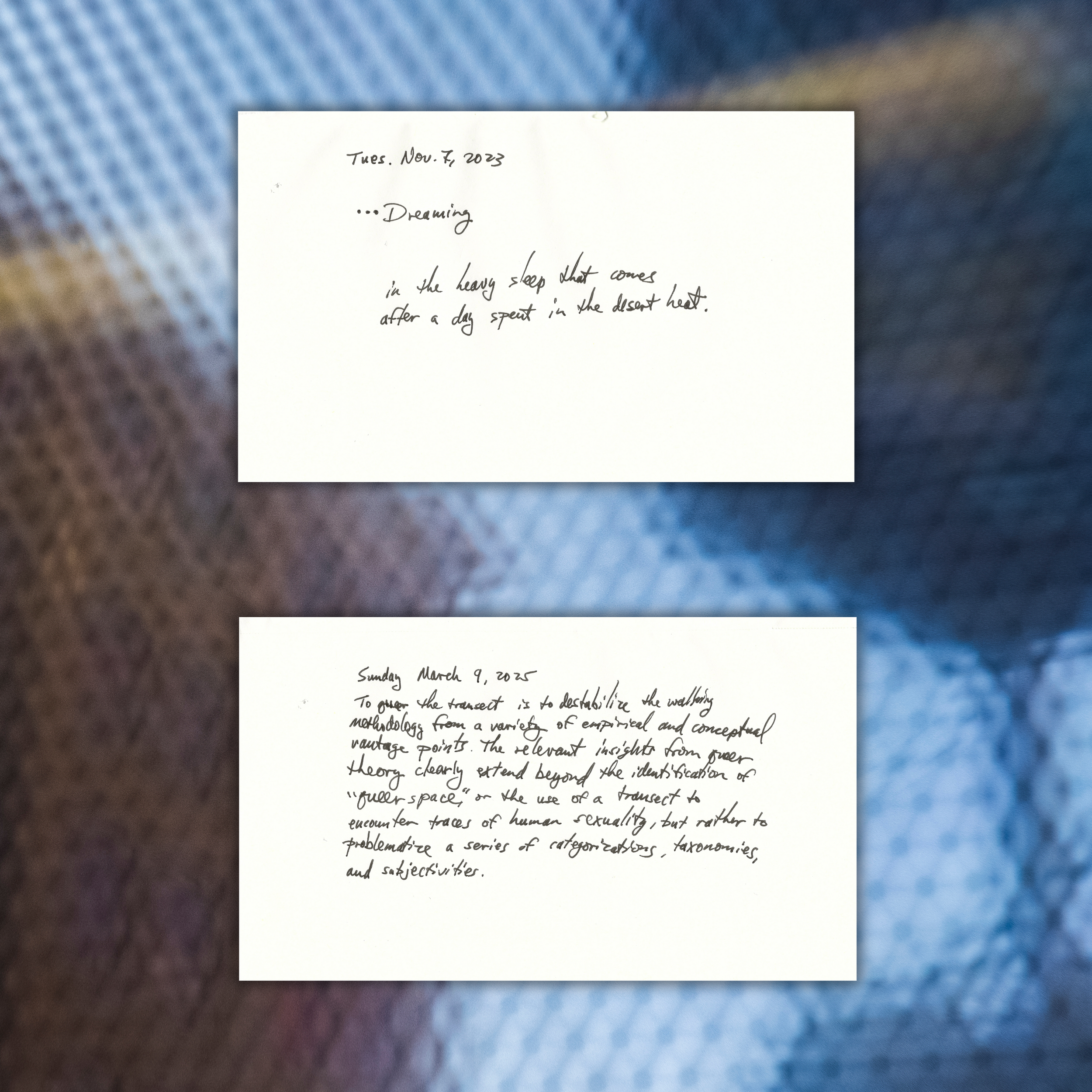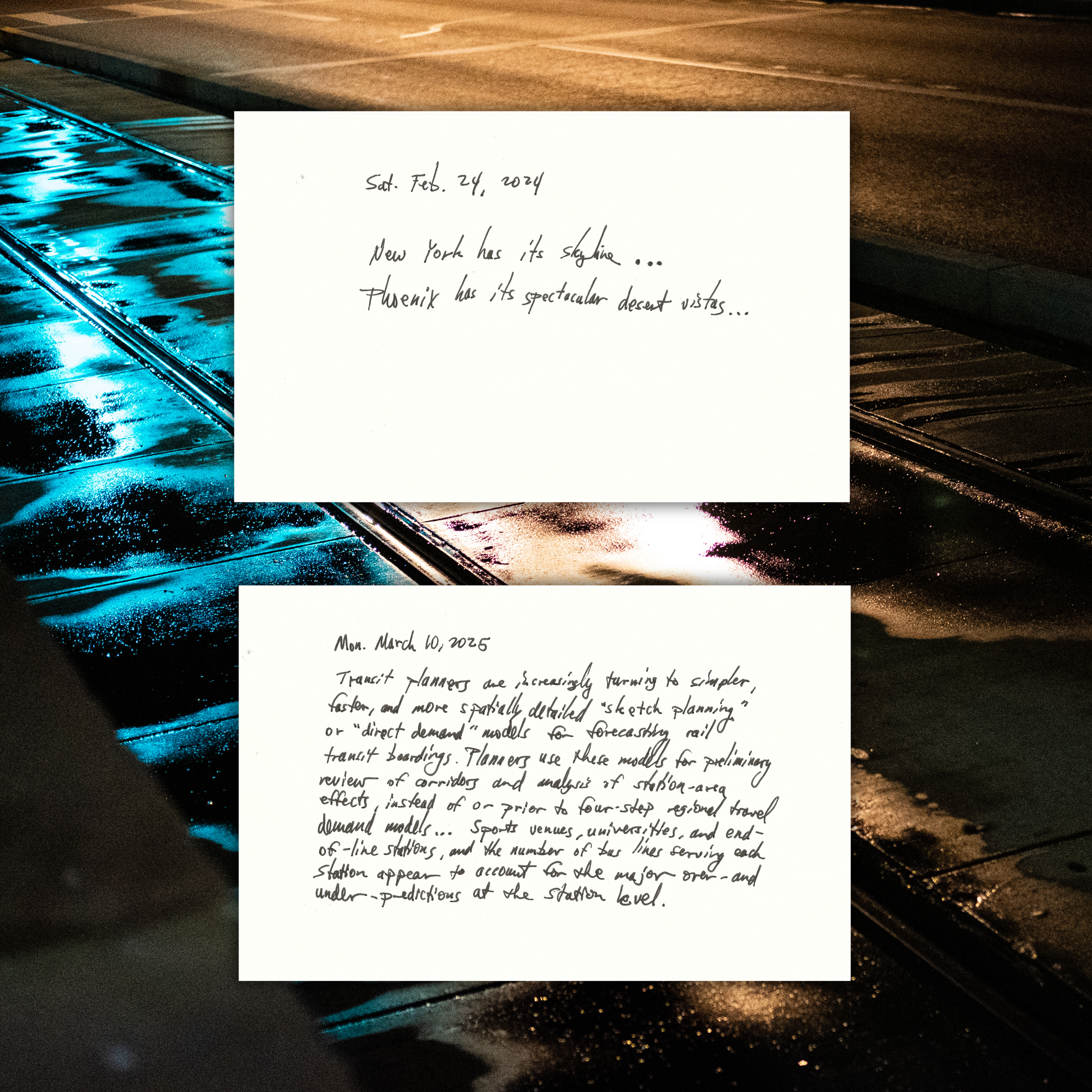 Image 1 of 7
Image 1 of 7

 Image 2 of 7
Image 2 of 7

 Image 3 of 7
Image 3 of 7

 Image 4 of 7
Image 4 of 7

 Image 5 of 7
Image 5 of 7

 Image 6 of 7
Image 6 of 7

 Image 7 of 7
Image 7 of 7








A Desert Transect, Brian O'Neill
A transect can be a path along which occurrences of studied objects are counted and recorded, or it can refer to dividing something by cutting across it. It can also be used to describe a line across a habitat. Brian O’Neill reflects on these multiple meanings as a methodological proposition for his inquiry into thenascent logics of urban development in the cultural and physical geographies of Phoenix, Arizona.
Cities in the American Southwest uniquely function without a center yet also contain tenuous sinews of infrastructure struggling to sustain a specific urban modality amid sprawling expansions resistant to traditional urban “densification.” O'Neill takes us on an autoethnographic journey, integrating images, reflective writing, and sound recordings to illustrate daily life along Phoenix’s transit routes. His work highlights the distinctive challenges and complexities inherent in desert urban environments, and more broadly in crafting unique socio-cultural documents of our times.
This project is augmented by a sonic album, a music video created in collaboration with composer Wyoming Toad, and an extended dialogue and contextual essay. A Desert Transect offers an alternative approach to conducting and presenting social and visual research.
A Desert Transect is the second installment in O'Neill’s visual ethnographic Transects series, examining the intersections between social dynamics, urban life, and nature.
——————
Brian O’Neill is a sociologist, writer, and photographer based in Phoenix, Arizona. Trained in both the United States and France, his work explores the relations of society to nature, using a variety of documentary and analytical techniques. Much of his output to date has investigated the practices and meanings of "industry" to local communities and environments. Brian is widely published in both academic and artistic fields. He is a contributing editor at The Photobook Journal, and the host of the podcast, Immaterial Voices.
——————
Edition: 100
Page Count: 120
Dimensions: 8.5” x 5.5”
Format: Spiral Bound
Design: © Alex Wilk
Images + Text: © Brian O’Neill
ISBN: 978-1-962415-09-5
——————
LINKS:
A full discussion of the book project can be found on Immaterial Voices
A transect can be a path along which occurrences of studied objects are counted and recorded, or it can refer to dividing something by cutting across it. It can also be used to describe a line across a habitat. Brian O’Neill reflects on these multiple meanings as a methodological proposition for his inquiry into thenascent logics of urban development in the cultural and physical geographies of Phoenix, Arizona.
Cities in the American Southwest uniquely function without a center yet also contain tenuous sinews of infrastructure struggling to sustain a specific urban modality amid sprawling expansions resistant to traditional urban “densification.” O'Neill takes us on an autoethnographic journey, integrating images, reflective writing, and sound recordings to illustrate daily life along Phoenix’s transit routes. His work highlights the distinctive challenges and complexities inherent in desert urban environments, and more broadly in crafting unique socio-cultural documents of our times.
This project is augmented by a sonic album, a music video created in collaboration with composer Wyoming Toad, and an extended dialogue and contextual essay. A Desert Transect offers an alternative approach to conducting and presenting social and visual research.
A Desert Transect is the second installment in O'Neill’s visual ethnographic Transects series, examining the intersections between social dynamics, urban life, and nature.
——————
Brian O’Neill is a sociologist, writer, and photographer based in Phoenix, Arizona. Trained in both the United States and France, his work explores the relations of society to nature, using a variety of documentary and analytical techniques. Much of his output to date has investigated the practices and meanings of "industry" to local communities and environments. Brian is widely published in both academic and artistic fields. He is a contributing editor at The Photobook Journal, and the host of the podcast, Immaterial Voices.
——————
Edition: 100
Page Count: 120
Dimensions: 8.5” x 5.5”
Format: Spiral Bound
Design: © Alex Wilk
Images + Text: © Brian O’Neill
ISBN: 978-1-962415-09-5
——————
LINKS:
A full discussion of the book project can be found on Immaterial Voices

